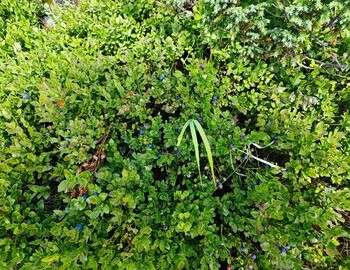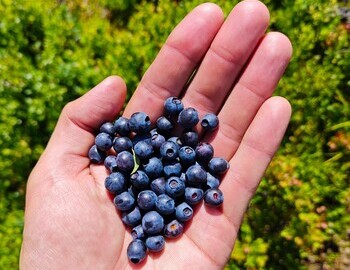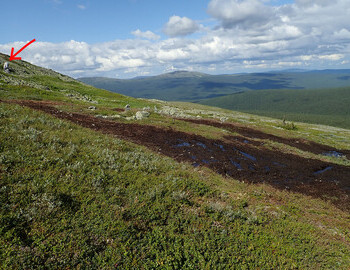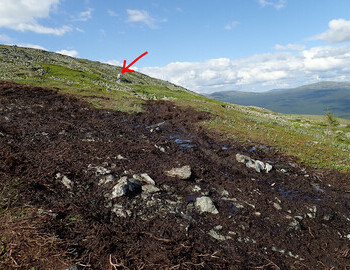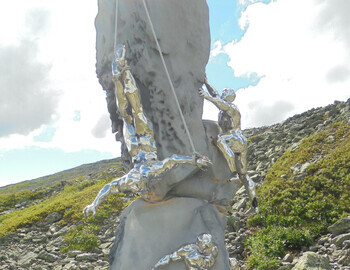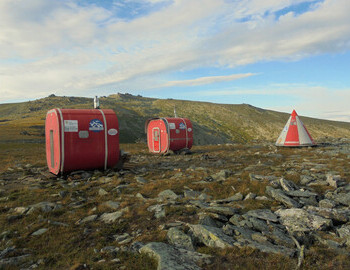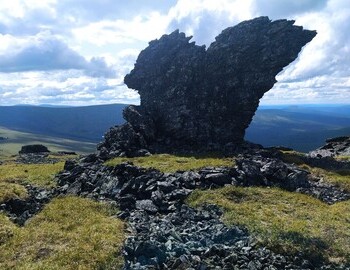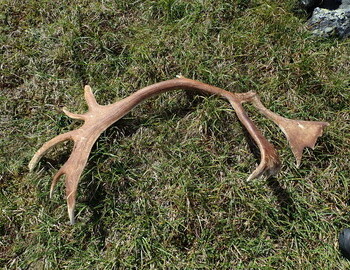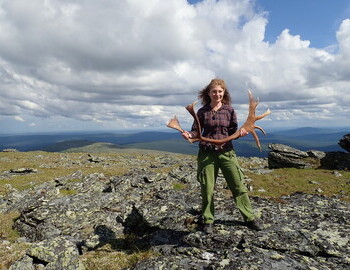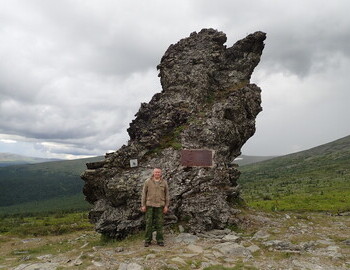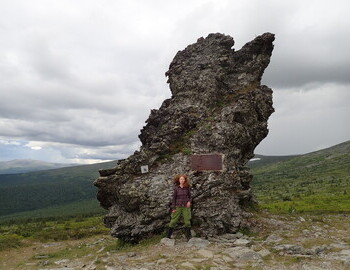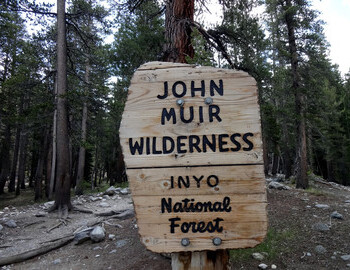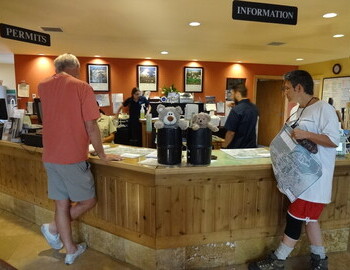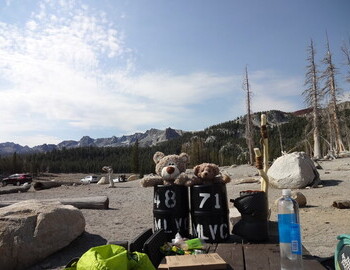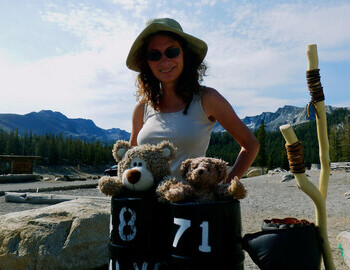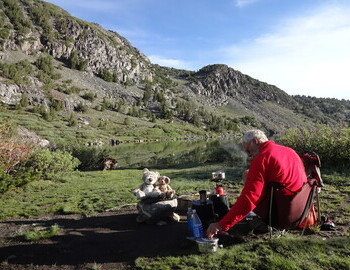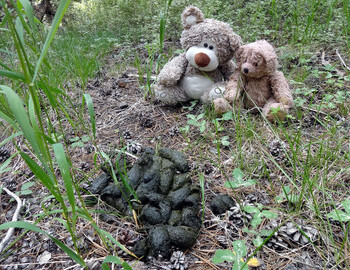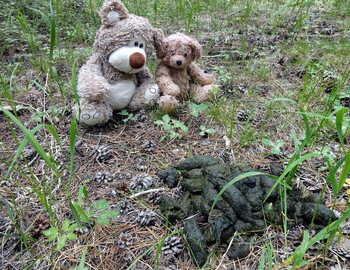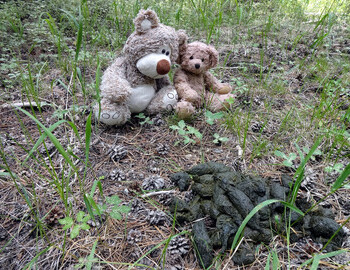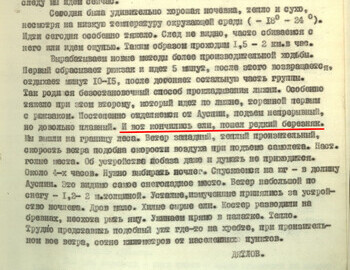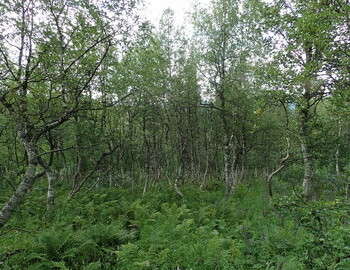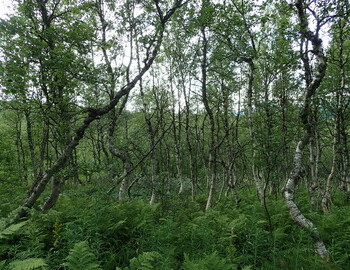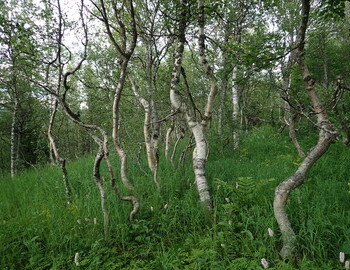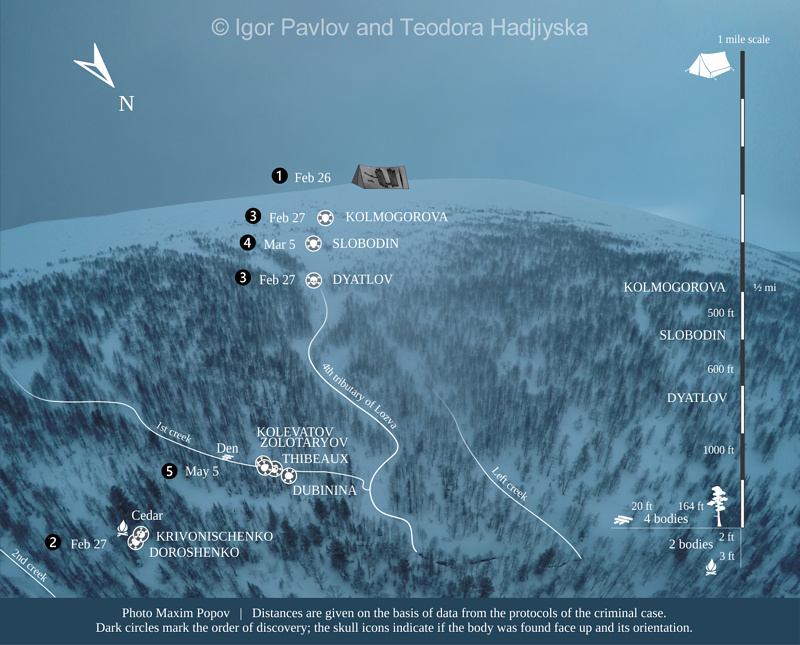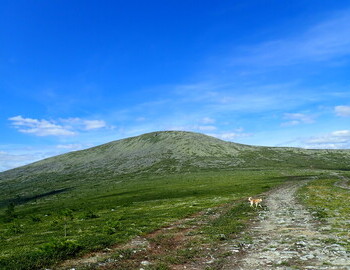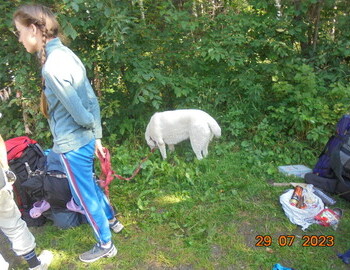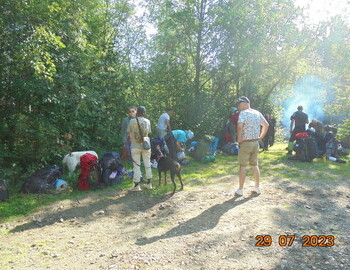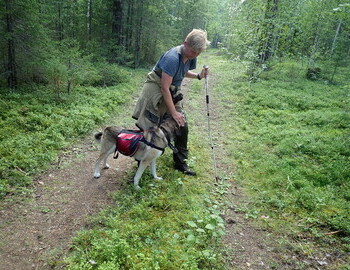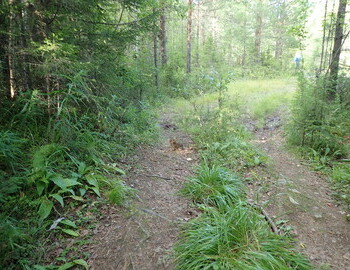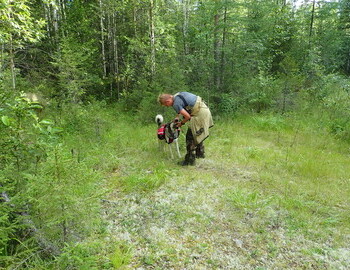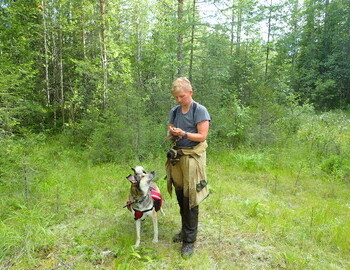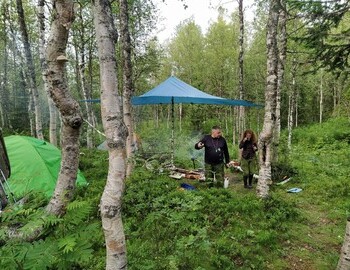
My Bear Story
This is the story of how I met a bear on the Dyatlov Pass. We see them every year, the trick is not to get up close and alone. In July their cubs are 6-7 months old and the blueberries, their favorite food that covers the pass, have just ripened up. Imagine, these cubs have never tasted blueberries before in their lives. And here we come, tourists in ATVs, guns, rockets, fireworks, dogs, and all kinds of bear deterrents to claim the pass.
"Late in July or early in August, with the first ripening of huckleberries, blueberries and other berries, bears devote most of their attention to exploiting this high-energy food. In and around Banff National Park, grizzly bears have been documented eating more than 200,000 buffalo berries in a single day."
Source: Bear's Food and Diet (Bear Smart)
Behavior: Information on this subspecies is sparse. The bears build winter dens and typically will occupy these from October or November until late March, April or early May. Mating takes place between May and July and the cubs, usually two or three, are born in the den in January or February. They will remain with the mother for around two and a half years during which time she will not become pregnant again. Except for during mating and for mothers with cubs the bears are solitary.
Threats: Hunting, conflict with humans, mainly due to habitat loss (particularly due to the clear-cutting of forests), and, increasingly, poaching on a commercial scale to obtain gall bladders and other body parts for use in medicine.
Source: East Siberian brown bear (Bears Conservation)
We had two sick days on the southern side of the Dyatlov Pass, most of the men were with fever. When the group was ready to cross over I was eager to get to my precious cedar trees and decided to go ahead by myself. What could go wrong?
Factors that played role in the incident:
- I am used to going to the cedar from the location of the tent, the presumed Dyatlov group escape line. This time I took a shortcut from the outlier rock with the memorial plaque. There was no reason for me to go 500m to the tent location, especially that now with all the dirt tracks from the ATVs the landscape is terribly disturbed. The blotch marked with a red arrow is the 4 meters high monument that was erected in 2021.
- I was not alone. I was with Shamil, a strange bird. In a way we were birds of a feather because we always get lost and find very creative ways to get into trouble. Nowadays there are rescue modules installed on the way to Otorten. Tourists often take shelter and spend the night. In 2021 Shamil put his gas bottle on top of a burning stove, the explosion burned him and the people inside, ripped open the door and windows. Next year Shamil was on the Dyatlov Pass again but did not get to Otorten. This year he was attempting Otorten again but not before asking for a passage from the mountain. I was with him when he did this the day before the bear incident. We went to the Bird rock on Kholat Syakhl. I was running in front of him. Shamil was singing and laying on the grass looking at the clouds. So I reached the Bird rock before him and had my moment, I was told that all I need lies in front of me and no need to go ways to achieve something. 5 mins after this "message" I found in my feet a spectacular sample of antlers. I don't know what was the "message" Shamil got from the Bird rock but now I can joke that it was about a human sacrifice.
On July 23, 2023 I walked ahead of Shamil, same as the day before. The moment I stepped into the taiga forest I slowed down because I was into uncharted territory. Shamil went in front of me keeping his pace but I couldn't follow through the thick shrubbery. He presumed I was behind him. This is how I got lost. I started whistling with every breath out and screaming Shamil's name. He didn't hear me. Revelation number one: the forest absorbs sounds. I decided to include Shamil in my story because I didn't go there on my own, although going with Shamil doesn't make a strong case, and secondly to explain that for the first two hours I was trying to find Shamil, and not my way out. I was seeing bent grass and following the trail hoping to find him. It is possible that I was going in circles, I had a visual with the mountains at all times, so it is not like I was lost in terms of directions. I was trying to find my party, this is what was driving me in circles, following false traces, or were they?
On the trail I saw a pile of poop. Didn't raise an alarm since it was fresh but small, I thought it left by a deer. I took 5 more steps and had a déjà vu. In 2015 Ron, Carol and I hiked John Muir National Park. It is regarded as Bear country. We had to get the bear proof canisters and all the shebang. And we saw bears. I was not afraid because we were assured that we would see bears and told mostly what not to do. It had to do mainly with leaving food and smelly things in general laying around. On this trek we saw a steaming pile of bear scat. Then Ron said: "She is watching us right now."
She is watching me right now lit like a neon sign inside my brain. I was paralyzed with fear, didn't dare to even move my head but only lifted my gaze. And there she was, looking directly at me. Since the terrain was ridden with streams hidden in high vegetation I was watching my feet so I don't fall through and twist an ankle or something. If it wasn't for the poop I would have stopped very close, and come face to face. At this particular moment I was 20-30m (70-100 feet) from the bear. She was watching me attentively full frontal. The whistle went dead in my mouth. The only thought in my head was "This is how it ends." I don't remember unbuckling two belts but my backpack dropped and I started moving away to the right. Slowly. No idea why I dropped my backpack. This was a mistake. I don't want to say BIG mistake because it will sound like it had consequences, but this quickly became a big problem for me. I already knew that there are good chances to have to spend the night alone, or with the bear. If the former I would need my backpack. Another consideration was that if I survived we would turn into a "forest dweller" (this is what the word Mansi means) for the next days, searching for my backpack. We were already two days behind because the guys got sick, and chances were that I would never find it, with everything inside - passport, money, incremental borer for $2000 donated by Haglöf Sweden which I haven't even used yet. If nothing else, take this from My Bear Story - the true meaning of Mansi is "forest dweller". So I went back, didn't look around, picked up my backpack and started walking again. Silently. The first bird that flew out from the bushes caused me to scream so loud that I felt the crowns in my mouth vibrating in a different frequency. I just couldn't stop it.
Fear sometimes arranges the priorities in your brain. You either lose it or get it together. But you never know which way it will go. That day I forgot about Shamil and everyone and started thinking what should I do, relying only on myself. I remember the map from my own book (enclosed below). It was laid on a real photo from the area. And I started walking in a straight line, not minding streams and drops, only trying to get as south as possible. On the three photos after the page from the group's diary with Igor Dyatlov's entry I am showing what the forest looks like when NOT lost on your way to the Cedar. Now it's dubbed the "Drunken forest". What I was surrounded by were dark coniferous trees and bushes taller than me. Igor Dyatlov mentioned in his last note in the group's diary: "Thin birch grove replaces firs." This is what I was looking for.
My goal became to cross the last stream on this side of the mountain, get out of this unfamiliar neck of the woods, and find the "thin birch grove", sure sign that I am on the right path to where the bodies were found in May, 1959.
I believe that what saved me was that the cubs pooped first, and then the bear stopped, so when I followed their trail, because this is what led me to them, I was following trampled grass, the cubs were behind her. I was calling for help when Olga Taymen heard me. Women catch sounds with higher frequency than men, and I was screaming my head off. The contingency plan of my group was to climb on the ridge and wait to see the smoke from my fire but it didn't come to that. In retrospect, what I did right and wrong:
- If the bear is stationary, move away slowly and sideways; this allows you to keep an eye on the bear and avoid tripping. Moving sideways is also non-threatening to bears.
- Do not drop your pack as it can provide protection for your back and prevent a bear from accessing your food.
A must read: Staying Safe Around Bears (National Park Services)
On our way back we shared a ride with Elena and Timur Bakaev returning from a night on Otorten. They said that in the module where they spent the night was a note warning about a bear with three cubs that was chased down in the forest by dogs.
- If your dog is hiking with you, it is imperative that you keep the dog on a SHORT leash and DO NOT let it roam free – this is for the safety of your dog, yourself, and wildlife.
This is definitely not the case on the Dyatlov Pass. I am enclosing photos of how a rabbit got snuffed in seconds and the owner of the dog explained that his dog is raised in the city and here is overwhelmed by smells, his instincts go haywire. The bear I met had three cubs, and was chased by dogs into the forest. Somehow I don't feel like being the victim here and feel more like a trespasser.
Russia Is A Real Bear Country!
The largest number of these animals in the world live here! And there’s not just one species, but three.
Russians joke that there’s a simple way to find out what kind of bear is chasing you: if you run, climb a tree and the bear climbs next to you, it’s a brown bear. If you run, climb a tree and a bear shakes it, it’s a black bear. If you run, but there are NO trees, it’s most likely a polar bear.
What species of bear live in Russia? (Russia Beyond)
Types of Russian Bear (Express to Russia)

